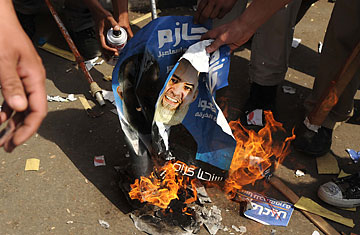
Egyptians against Salafist candidate Hazem Abu Ismail burn his posters in Cairo on April 6, 2012 as thousands of his supporters gather nearby to protest against a decision to rule him out of Egypt's presidential election.
Egyptian election authorities disqualified three top presidential candidates and a handful of others over the weekend, in a move that has radically shaken predictions for the May vote. The Presidential Elections Commission ruled Saturday night that the popular ultra-Islamist candidate Hazem Abu Ismail, the Muslim Brotherhood's candidate Khairat al-Shater, and Omar Suleiman, the former spy chief and vice president of ousted President Hosni Mubarak, had all failed to meet candidacy requirements and would therefore be barred from running. They have until Monday night to make their appeals.
The latest twist in a presidential race — one that has increasingly becoming the butt of jokes and comparisons to soap operas — adds to the uncertainty surrounding Egypt's political future. More than a year after a popular uprising toppled Mubarak's 30-year-old regime, and less than two months ahead of an election that will formally decide his replacement, many Egyptians say they still have no idea who it's going to be.
The weekend's news yielded reactions from the public ranging from relief to warnings of conspiracies and violence. The Muslim Brotherhood's Freedom and Justice newspaper ran a doctored front-page picture of Omar Suleiman behind bars, just days after thousands of people, led by the Brotherhood, had taken to Cairo's Tahrir Square to protest his sudden candidacy. Liberal youth activists used twitter as a medium to express their own relief at the dismissal of Hazem Abu Ismail, who some view as an extremist; while many of Abu Ismail's supporters — a number of whom had camped for days in front of the election commission headquarters in protest of his imminent disqualification — cried foul, and threatened to take to the streets.
Abu Ismail's disqualification followed reports by the election commission earlier this month that it had obtained documents proving that Abu Ismail's late mother held U.S. citizenship — a violation of current election rules. Omar Suleiman had failed to authenticate the minimum required number of votes — 30,000, from at least 15 governorates; while Khairat al-Shater was reportedly rendered ineligible by Mubarak-era convictions on terrorism and money-laundering charges.
"With each morning, we find a new decision and a new direction," Amr Khafagy, the editor-in-chief of the popular daily, Al-Shorouk, told TIME. But the outcome of the election commission's decision will serve the country's best interests, he added. "[The Islamists' candidacy] had been confronted with a lot of opposition from intellectuals and political powers because all of the powers in Egypt believe that it's necessary to have a president that is not an Islamist," he said. The elimination of the Brotherhood's Khairat al-Shater and Hazem Abu Ismail goes well toward accomplishing that.
According to the independent daily Al-Masry Al-Youm, Abu Ismail on Saturday raised the question of a broader conspiracy surrounding the election commission's decision, alleging that Omar Suleiman was a bluff to begin with — a decoy candidate, whose inevitable disqualification from the race served only to legitimize the disqualification of Islamists like Abu Ismail and Shater. "All of this happened when the Islamists became powerful in the race. When the SCAF sees the beard, they become afraid because they know the path of Islam does not allow for corruption," says Mohamed Sadeq, a supporter of Abu Ismail. "For now, we are waiting for the appeal, but God willing, Abu Ismail will be back in the race. If he isn't Sadeq says he'll refuse to endorse anyone else. "I will go and write in Abu Ismail's name so that they cannot forge my vote like they did for the past 30 years."
Others, however, say the allegations of foul play — and even fresh political turmoil — are overblown. If anything, the disqualifications prove the commission was simply following the rules, says Mustapha al-Sayyid, a professor of political science at Cairo University. "I think we underestimated the capability of the presidential election commission," he says. Many Egyptians assumed that it would be swayed by the ruling military council, and that the council favored Mubarak's former right-hand man, Omar Suleiman. "But if the commission objected to Omar Suleiman's [candidacy], it means that either there was pressure [from the military] that they didn't respond to, or there was no pressure whatsoever."
The competition also remains rich, al-Sayyid adds. The man popular opinion polls had pegged as an early front-runner — ex-Arab League chief Amr Moussa — will likely remain as so, he says. Anticipating Khairat al-Shater's possible disqualification, the Muslim Brotherhood put forward a back-up candidate last week: Mohamed Morsy. That may lower the Brotherhood's chances. Morsy lacks charisma and name recognition in a race where those two factors matter more than party, al-Sayyid says.
But that doesn't mean Moussa is going to have an easy race. "Now we have three big candidates: Amr Moussa, Abdel Monem Abol Futuh, and then the Brotherhood's candidate," says Khafagy. "We will have a presidential race with 13 candidates" — most of whom, including the champion of the liberal youth, will fall flat, he predicts. Amr Moussa, who draws wide support from the Egyptian street for his reputation as an experienced politician and a critic of Israel, will likely gain more votes from any would-be supporters of Suleiman — those nostalic for the stability of the ex-regime. Abol Futuh, a moderate with a long history in the political opposition as a former member of the Muslim Brotherhood will draw votes from the Islamists, he says. "Thus, we're looking at a battle between Amr Moussa and Abol Futouh. What we need to know now is if it's going to be resolved in the first round or after a run off."
With reporting by Sharaf al-Hourani/Cairo
